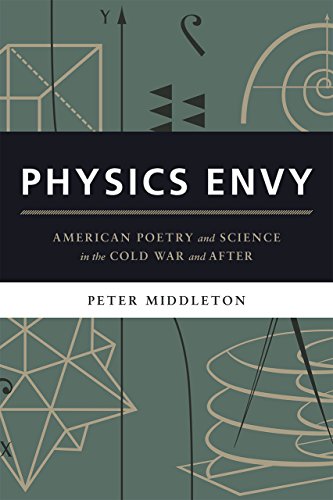All books / Book
Physics Envy: American Poetry and Science in the Cold War and After

| Full title: | Physics Envy: American Poetry and Science in the Cold War and After |
|---|---|
| ISBN: | 9780226290003 |
| ISBN 10: | 022629000X |
| Authors: | Middleton, Peter |
| Publisher: | University of Chicago Press |
| Edition: | 1 |
| Num. pages: | 272 |
| Binding: | Hardcover |
| Language: | en |
| Published on: | 2015 |
Read the reviews and/or buy it on Amazon.com
Synopsis
In Physics Envy, Peter Middleton Argues That Science Has Had A Strong Influence On The Course Of American Poetry Since Wwii. He Focuses On Poets As Different As Charles Olsen, Robert Duncan, John Ashbery, And Others, And How They Responded To Advances In Science (especially Physics) In The Development Of Ambitious Poetry Programs And Poetics. For Middleton, The Major Shift Came In The 1970s, When The More Traditional New American Poetry Gave Way To The Experiments Of Language Poetry, And He Shows Surprising Correlations Between How Poetry Was Conceived And Written, On The One Hand, And The Advances In Physics, Chemistry, And Biology At The Time, On The Other. Though It Was Discoveries In Physics (e.g., The Atomic Bomb) That Started This Science Envy After The War, Middleton Finds Poets Borrowing And Adapting Language From The Other Sciences As Well, For Example, The Way The Language And Concepts Used By Biologists Were Taken Up By Poets And Poetry Theorists To Create Their Own Recombinant Poetics Of Language, Often Calling What They Did, However Abstract, Inquiries And Experiments In Language. Even The Ideas And Language From The Leading Popular Scientific Journal, Scientific American, Began Appearing In Poems In Magazines And Books. And A Poet Like Gary Snyder, Whose Work Seems To Be Inspired By Buddhist And Shamanistic Sources, Also Draws, As Middleton Shows, On Ecological Science--sometimes Directly From Textbooks On The Subject. Middleton Writes A History Of Science And Poetry That Shows How They Throw Beneficial Light On Each Other's Dilemmas, And Uncovers Areas Of Unacknowledged Exchanges Of Ideas Between Poets And Scientists. As Middleton Shows, Poetry Since Wwii Can Often Be Read As A Thoughtful, Productive Quarrel Between The Oppenheimers And Watsons Of Science, And Poets And Poetic Experimenters Attempting An Intellectual Inquiry Into The Nature Of Things. Poets And Poetry Critics, Literary Historians, And Those In History And Philosophy Of Science Will Want To Read This Book.